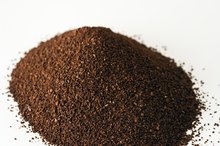What does fact checked mean?
At Healthfully, we strive to deliver objective content that is accurate and up-to-date. Our team periodically reviews articles in order to ensure content quality. The sources cited below consist of evidence from peer-reviewed journals, prominent medical organizations, academic associations, and government data.
- Journal of Analytical Toxicology: Caffeine Content of Decaffeinated Coffee
- Journal of Analytical Toxicology: Caffeine Content of Decaffeinated Coffee
The information contained on this site is for informational purposes only, and should not be used as a substitute for the advice of a professional health care provider. Please check with the appropriate physician regarding health questions and concerns. Although we strive to deliver accurate and up-to-date information, no guarantee to that effect is made.
Decaffeinated Coffee and Heart Palpitations
The term "decaffeinated" may imply an absence of caffeine, but your cup of decaf still contains small amounts of this natural stimulant. The Permanente Group notes that just like regular coffee, large amounts of decaffeinated Joe may cause heart palpitations, as can other caffeine-laced products such as cola and tea 12. Although a pounding or fluttering heart is usually harmless, protect your health by visiting your doctor if you experience such palpitations 2. In rare cases, they may indicate a serious cardiovascular condition.
Caffeine in Decaf
In a study published in the "Journal of Analytical Toxicology" in 2006, scientists tested 10 varieties of drip-brew, decaffeinated coffee from different sellers and found that all but one sample contained between 8.6 and 13.9 milligrams of caffeine 1. The researchers also tested a dozen decaf espressos and coffees from one major coffee chain and found that each espresso shot contained between 3 and 15.8 milligrams of caffeine, while each 16-ounce serving of coffee contained between 12 and 13.4 milligrams. In comparison, 16 ounces of full-caffeine coffee contains about 170 milligrams of caffeine.
Related Articles
References
- Journal of Analytical Toxicology: Caffeine Content of Decaffeinated Coffee
- My Doctor Online: Heart Palpitations
- Science Daily: Decaffeinated Coffee Is Not Caffeine-Free, Experts Say
- Coffee, brewed, prepared with tap water. FoodData Central. U.S. Department of Agriculture. Published April 1, 2019.
- Caffiene in coffee. FoodData Central. U.S. Department of Agriculture. Published April 1, 2019.
- McCusker RR, Fuehrlein B, Goldberger BA, Gold MS, Cone EJ. Caffeine content of decaffeinated coffee. J Anal Toxicol. 2006;30(8):611-3. doi:10.1093/jat/30.8.611
- Coffee, instant, reconstituted. FoodData Central. U.S. Department of Agriculture. Published April 1, 2019.
- U.S. Department of Agriculture. Coffee, espresso. FoodData Central. Published April 1, 2019.
- Tea, hot, leaf, black. FoodData Central. U.S. Department of Agriculture. Published April 1, 2019.
- Soft drink, cola. FoodData Central. U.S. Department of Agriculture. Published April 1, 2019.
- US Food & Drug Administration. Spilling the beans: How much caffeine is too much?. Updated December 12, 2018.
- Rogers PJ, Heatherley SV, Mullings EL, Smith JE. Faster but not smarter: Effects of caffeine and caffeine withdrawal on alertness and performance. Psychopharmacology (Berl). 2013;226(2):229-40. doi:10.1007/s00213-012-2889-4
- Freedman ND, Park Y, Abnet CC, Hollenbeck AR, Sinha R. Association of coffee drinking with total and cause-specific mortality. N Engl J Med. 2012;366(20):1891-904. doi:10.1056/NEJMoa1112010
- Voskoboinik A, Kalman JM, Kistler PM. Caffeine and arrhythmias: Time to grind the data. JACC Clin Electrophysiol. 2018;4(4):425-432. doi:10.1016/j.jacep.2018.01.012
- Papakonstantinou E, Kechribari I, Sotirakoglou Κ, et al. Acute effects of coffee consumption on self-reported gastrointestinal symptoms, blood pressure and stress indices in healthy individuals. Nutr J. 2016;15:26. doi:10.1186/s12937-016-0146-0
- The American College of Obstetricians and Gynecologists. Moderate Caffeine Consumption During Pregnancy. Committee Opinion: 462. Published August 2010.
- Drake C, Roehrs T, Shambroom J, Roth T. Caffeine effects on sleep taken 0, 3, or 6 hours before going to bed. J Clin Sleep Med. 2013;9(11):1195-200. doi:10.5664/jcsm.3170
- Alstadhaug KB, Andreou AP. Caffeine and primary (migraine) headaches-friend or foe?. Front Neurol. 2019;10:1275. doi:10.3389/fneur.2019.01275
- Lara DR. Caffeine, mental health, and psychiatric disorders. J Alzheimers Dis. 2010;20 Suppl 1:S239-48. doi:10.3233/jad-2010-1378
- National Institute of Diabetes and Digestive and Kidney Diseases. Eating, diet and nutrition for GER and GERD. Updated November 2014.
- Jiwani AZ, Rhee DJ, Brauner SC, et al. Effects of caffeinated coffee consumption on intraocular pressure, ocular perfusion pressure, and ocular pulse amplitude: A randomized controlled trial. Eye (Lond). 2012;26(8):1122-30. doi:10.1038/eye.2012.113
- Mitchell DC, Knight CA, Hockenberry J, Teplansky R, Hartman TJ. Beverage caffeine intakes in the U.S. Food Chem Toxicol. 2014;63:136-42. doi:10.1016/j.fct.2013.10.042
Writer Bio
Nina K. is a Los Angeles-based journalist who has been published by USAToday.com, Fitday.com, Healthy Living Magazine, Organic Authority and numerous other print and web publications. She has a philosophy degree from the University of Colorado and a journalism certificate from UCLA.









